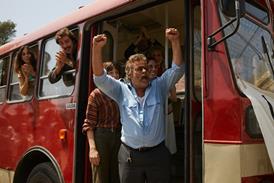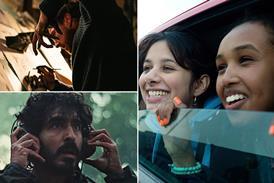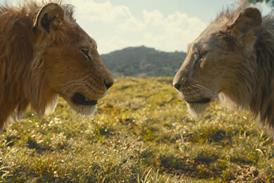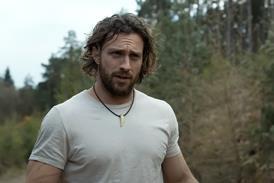Dir. Julio Medem. Spain. 2003. 115 mins.
Put this down as another well intentioned, dedicated but not terribly effective attempt to open up a dialogue within the Basque discord, one of the more stubborn ongoing conflicts smouldering in the world today. With the name of Julio Medem (Sex And Lucia, winner of two Goyas), among the best-known Iberian directors right now, attached to it, it is bound to attract plenty of attention, generating heated discussion and controversy at home and keen interest abroad. Despite arguments in Spain about the film's impartiality, it is still a serviceable, though by no means comprehensive or objective, introduction to the Basque cause for television markets unfamiliar with the issue.
The flack has been has been flying in Spain long before this documentary's San Sebastian premiere in the Zabaltegi programme, with a couple of interviewees featured demanding to be cut, as they disagree with the general separatist gist of the finished product (others may follow suit). There has also been outright opposition from the country's ruling party, the PP, while the Committee for the Victims of Terrorism refused to allow their representatives to talk to Medem.
The director uses the Basque national sport of la pelota vasca - which consists of hitting a wall as hard as possible with a small rubber ball - as a metaphor for the conflict itself. A Basque by birth (although actually from San Sebastian) and now living in Madrid, he purports to adopt an objective view of the conflict, but cannot but help sympathise with his ancestors. This becomes evident when he describes the origins of the confrontation between the Basques (possibly the most ancient European nation, who can be found in south-west France and the north-western Iberian Peninsula), and the Spanish centralist government. It is a conflict that has its roots in the faraway past and grew fiercely under the Franco regime.
Using documentary footage including an Orson Welles visit to the Basque country - and his typical accompanying remarks about the country and the people - and excerpts from feature films dealing with the conflict (such as Helena Taberna's Yoyes), Medem packs his documentary with an enormous amount of interviews. They include politicians - like former Spanish premier Felipe Gonzalez - journalists, academics, writers, poets, musicians and those whose lives have been lived under the shadow of militant Basque group ETA, either due to threats or bomb attacks. It all adds up to an attempt by Medem to ensure that most opinions are represented in the picture, if not by active supporters then at least by the passive sympathisers.
The purpose of it all is to argue, as one of the interviewees puts it, that "no problem is solved with the word No" and that the first step to reaching an understanding of any kind is to listen to each other and realise that truth and justice are never on one side only.
The task of preserving a national identity when only half the people claiming to it are familiar with the national language and less than a quarter uses it on a regular basis is evidently a difficult one. Defining whether those who fight for the cause are idealists or fanatics, dreamers or terrorists also depends on the point of view of each individual. Medem, who uses the spectacular backdrops of the Basque country for most of his interviews, intercut with pelota vasca, leans naturally towards the more lenient definitions. By editing 150 hours of interviews in the way he has, he argues that there is a clear distinction between nationalism and terrorism (he supports the former and rejects the latter) producing mountains of arguments to support his position.
Sometimes, however, his actions can be deemed embarrassing, if not downright offensive by those concerned, as when he juxtaposes the relatives of bomb victims with complaints by the families of terrorist prisoners about the difficulties of jail visits.
While it is admirable to advocate that dialogue is the correct approach to take in any conflict of this kind, the world is sadly riddled with too many extremists who will not accept it. Without their input, any film like this, as detailed and as documented as it may, is simply one more act of good will, to be applauded by the supporters and put on a shelf for archival purposes.
Prod co: Alicia Produce
Int'l sales: Golem Distribucion
Prods: Julio Medem, Koldo Zuazua
Cinematography: Javier Aguirre, Jon Elicegui, Ricardo de Gracia
Ed: Julio Medem
Music: Mikel Laboa
Sound: Pablo Bueno


















No comments yet